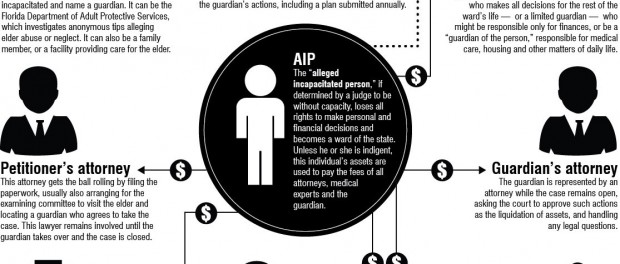Florida: Little common ground in debate on guardianship
By Barbara Peters Smith
Published: Monday, October 19, 2015 at 3:59 p.m.
http://www.heraldtribune.com/article/20151019/ARTICLE/151019615/0/search?tc=ar
CLEARWATER – With professional guardians on one side of a public library meeting room Monday, and those who consider themselves victims of Florida’s adult guardianship system on the other, little consensus was achieved in a debate on whether the current system endangers elders or safeguards them.
Clearwater guardian Fernando Gutierrez invited Sam Sugar, an Aventura physician who founded Americans Against Abusive Probate Guardianship in 2013, to face him in a live discussion of Florida’s approach to protecting incapacitated or frail adults who cannot make their own decisions. With Gutierrez insisting that most professional guardians are conscientious, and Sugar claiming that many violate their trust and profit from their wards, it appeared that few minds were swayed.
When the formal debate gave way to members of the audience challenging each other, a library staffer stepped in to thank everyone for coming and asked them to clear the room.
Gutierrez began by noting that Florida’s guardianship statute is considered a model for other states. It gives judges power to remove an elder’s civil rights and appoint a family or professional guardian to make all legal, financial and medical decisions for that person. While the statute gives preference to family members as guardians, in practice judges often prefer to appoint professional guardians when a ward’s relatives disagree.
“Family discord, which is usually the genesis of all this stuff, allows the judge to say I don’t believe you and I don’t believe you,” Sugar said. “We are in the single greatest intergenerational transfer of wealth in history, and for some guardians it’s easy pickings.”
Problems with the process were the basis of a Herald-Tribune series last December, “The Kindness of Strangers: Inside Florida’s Elder Guardianship System.” Through case studies, the series looked at wards and their families who felt trapped in a legal maze they did not understand.
After those articles appeared, three guardianship reform bills were introduced in Florida’s 2015 legislative session. Only one was signed into law: HB 5 — written by Rep. Kathleen Passidomo, R-Naples — which tightened many aspects of the statute that had made it easy to seize control of elders’ assets, and also more clearly spelled out the duties of a state-appointed guardian. Recently Sen. Nancy Detert, R-Venice, re-introduced legislation, SB 232, that would establish an Office of Public and Professional Guardians to supervise court-appointed guardians.
Gutierrez, who has certifications in bioethics, acknowledged that improvements to the system are needed. He believes paid guardians should have additional training in medical issues, or be required to consult specialists when they lack such training.
“If we want to make our guardianship laws and statutes stronger — to be one the whole nation looks up to — we have to tighten them,” he said.
But Sugar countered that extra education would not resolve the fundamental problems he perceives in adult guardianship.
“If you train somebody whose only goal is business ethics, all you get is a highly trained businessman,”Sugar said. “If life-or-death decisions are going to be made about my loved one, the right person to make the decision is not a total stranger.”
Gutierrez repeatedly made the point that media depictions of the system rarely mention how much unpaid work guardians and attorneys perform on wards’ behalf.
“We have many, many pro bono cases that no one ever hears about,” said Gutierrez, who estimated that 20 of his wards are indigent. “Guardianship is a very difficult profession. Most people would not do it, and they should have more compassion for those of us who have taken on this noble profession.”






